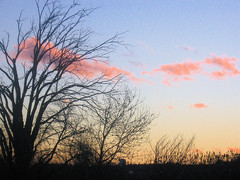Around the pale- blue dome of the heavens a few pearl- colored clouds hung motionless, as though the wind had been withdrawn to other skies. Not a crimson leaf floated downward through the soft, silvery light that filled the atmosphere and created the sense of lonely, unimaginable spaces. This light overhung the far- rolling landscape of field and meadow and wood, crowning with faint radiance the remoter low- swelling hill- tops and deepening into dreamy half- shadows on their eastern slopes. Nearer, it fell in a white flake on an unstirred sheet of water which lay along the edge of a mass of sombre- hued woodland, and nearer still it touched to spring- like brilliancy a level, green meadow on the hither edge of the water, where a group of Durham cattle stood with reversed flanks near the gleaming trunks of some leafless sycamores. Still nearer, it caught the top of the brown foliage of a little bent oak- tree and burned it into a silvery flame. It lit on the back and the wings of a crow flying heavily in the path of its rays, and made his blackness as white as the breast of a swan. In the immediate foreground, it sparkled in minute gleams along the stalks of the coarse, dead weeds that fell away from the legs and the flanks of a white horse, and slanted across the face of the rider and through the ends of his gray hair, which straggled from beneath his soft black hat.
—James Lane Allen, "Two Gentlemen of Kentucky," originally published in The Century Magazine, April 1888.



